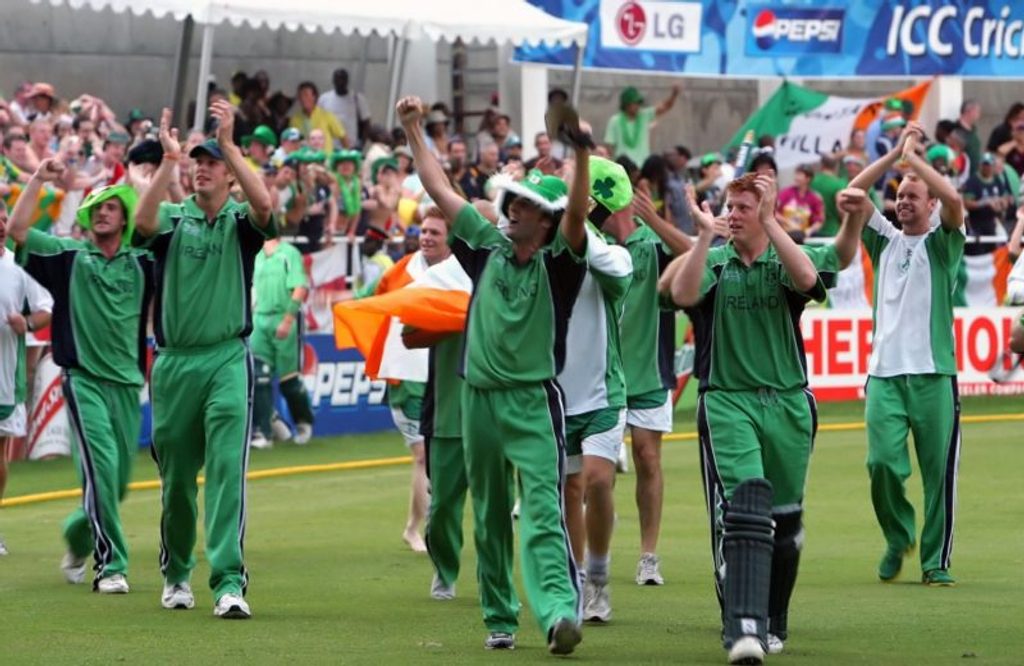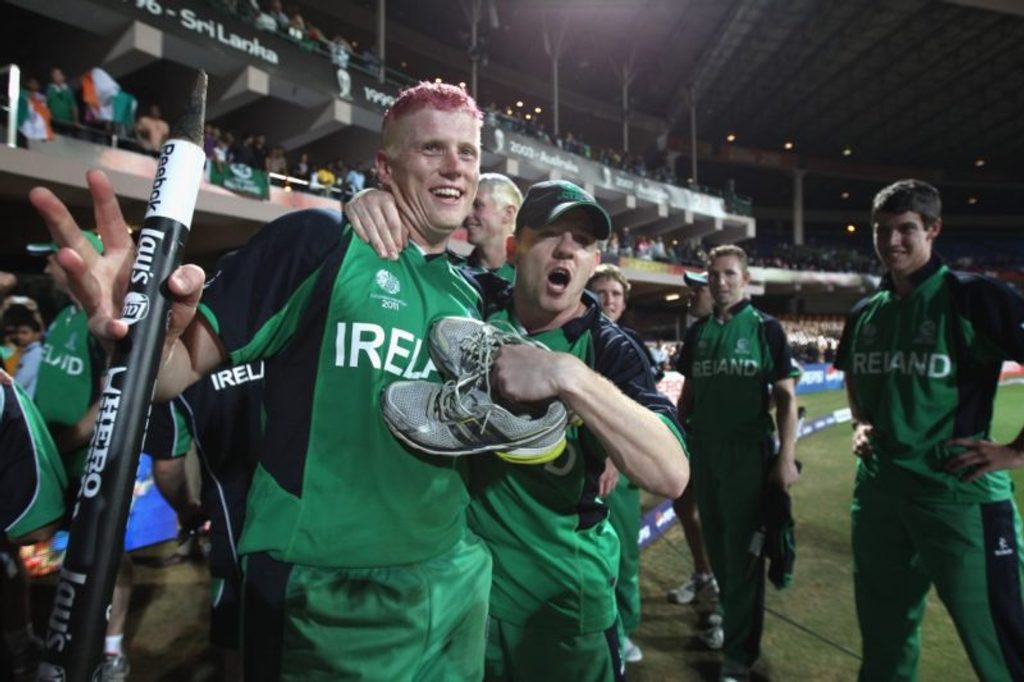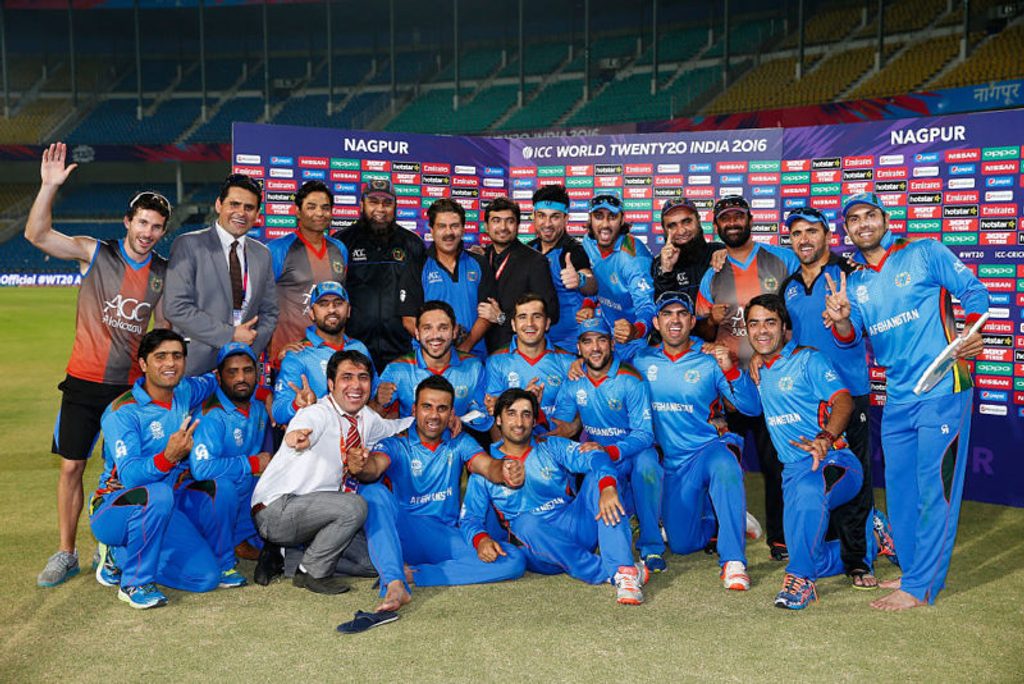
Back in 2013, Associate cricket aficionado Tim Brooks pondered whether Ireland’s quest for Test status was more fairytale than reality. Now it’s happened. What a journey it’s been.
This article first appeared in The Nightwatchman, the Wisden Cricket Quarterly
Buy the 2018 Collection (issues 21-24) now and save £5 when you use coupon code WCM7
Originally published in 2013
Ever since Ed Joyce’s heroics saw Ireland qualify for the 2007 World Cup, Irish cricket has been on a quest for the holy grail of Test status. As a generation of Irishmen have flourished at English counties the men in green have pulled away from the chasing pack of Associates to become the heir apparent. High-profile victories against Pakistan and England have seen cricketing romantics across the globe champion their cause and lobby the ICC for the introduction of an 11th full member. Increased television coverage has provided both the team and individuals a platform for global recognition. Kevin O’Brien now spends much of his time answering Twitter messages from his Indian fan base, who are desperate to see their new hero in the IPL. Times have changed indeed.
This single-minded determination to prove their worth has underpinned the professionalisation of the sport in Ireland, which has undergone a transformation from the amateurish Irish Cricket Union to the ultra-ambitious, corporate Cricket Ireland. Development dossiers and strategic plans have been designed with just one target in mind. It has become as much about pride as potential. The buzz-term of the moment in ICC regional offices is ‘development pathways’ but is there one for Ireland? Or does the yellow brick road leading to full member status disappear in a haze as it crests a distant hill?
 Irish cricketers celebrate their victory over Pakistan in 2007 Cricket World Cup
Irish cricketers celebrate their victory over Pakistan in 2007 Cricket World Cup
Since the 1990s an ICC which has been enriched by lucrative media rights deals, has put a small pot aside for development of the global game. Though the Associate Member category was created in 1965 the ICC had traditionally had very little active involvement above and beyond paying a modest grant and staging the ICC Trophy every four years. But things changed with funding, as the promise of the new millennium encouraged a broader ambition, with a development framework established and regional offices supporting participation programmes, age group tournaments and regional leagues. Though largely going under the radar, due to the fixation of many on the Test match nations, development successes have been many and varied, including membership passing the 100 milestone and the establishment of the eight-division World Cricket League. The introduction of T20 in 2004 gave the ICC a short, exciting, marketable format that they hoped could turn cricket into a truly global game.
Ireland certainly chose a propitious time to prosper. By virtue of their World Cup qualification they gained ODI and T20I status (for the World Cup qualification cycle) and, more importantly, a place in the High Performance Programme. This increased their modest Associate Member grant considerably and gave them access to specialist coaching. Their funding, international calendar and infrastructure were as far removed from fellow Associates such as Italy as full members like India. They weren’t at the top table but neither were they skulking in the scullery. The Ireland which produced young spin sensation George Dockrell is a world away from that which nurtured Joyce. And yet this significant progress is not given its due because it isn’t the ultimate prize.
As Ireland came to dominate the Associate scene, so the calls for full member elevation grew louder. Since 2007 they have qualified for every World Cup, both 50-over and T20, and have enjoyed a virtual monopoly in the first-class Intercontinental Cup, that is in effect the second tier of Test cricket. At the same time they have developed domestic cricket, increased participation figures and improved grounds and facilities.
And so people began to ask what more they had to do. From a fan’s perspective, the team just had to be competitive. And the O’Brien brothers, Botha, White, Johnston, Porterfield and Stirling provided the nucleus of a squad that were. Simple. Black and white. Surely. But such a simplistic view was dispiritingly far removed from reality.
And this is where it gets complex. In theory each membership category of the ICC has eligibility criteria. For instance when the ICC consider new applications for Affiliate Membership, which it does every year, there are several fundamental, transparent, non-negotiable terms. They must have a full-time member of staff, a league with a minimum number of teams etc. These are judged by the regional development manager who, if satisfied, recommends their application, which is then ratified by the board. The same process applies for promotion from Affiliate to Associate. In that jump a key criterion is gaining a victory over an Associate nation in an official match. Again it is black and white, they either do or they don’t. However, this fair, transparent process breaks down when it comes to consideration for full membership. There are stated criteria but many are hopelessly vague and subjective. For instance, one is the requirement for cricket to be embedded in the sporting culture of the nation. Without any clarification of how this is measured it is effectively meaningless. That is to say it enables the ICC to make its own value judgement. Frustrated by this, Warren Deutrom, Chief Executive of Cricket Ireland,made an official application in 2009 with the intention of forcing the ICC to spell out what remaining criteria they had to fulfil. To provide a, ghastly term as it is, roadmap. This created headlines and was a bold statement of intent, but didn’t provoke the desired result. In 2012 Cricket Ireland reiterated this desire by announcing a strategic vision for full membership by 2020, a rise to 50,000 participants and a top eight ODI ranking. They are not taking no for an answer.
In 2012 Cricket Ireland reiterated this desire by announcing a strategic vision for full membership by 2020, a rise to 50,000 participants and a top eight ODI ranking. They are not taking no for an answer
Without measurable criteria their only guide has been a comparison with Bangladesh, who were elevated to Test status over a decade ago. On the field they appeared to be neck and neck. Both had dominated Asssociate cricket and claimed several full member scalps. Indeed if you include Morgan and Rankin, who defected to England, then Ireland have the stronger squad. But this, seemingly, was not sufficient. Could they be competitive in multi-day cricket? Well, the ICC haven’t given them the opportunity, by failing to grant the winner of the Intercontinental Cup a ‘Test’ against the weakest Test nation. The fact that the vast majority of the squad play regular four-day cricket in the County Championship suggests they could, so we can infer that it is not on-field pedigree that is the problem.
So to the off-field criteria and that “embedded in the sporting culture” condition. Several Irishmen of my acquaintance don’t even know Ireland has a cricket team, whereas the vast majority of Bangladeshis are cricket obsessives. In commercial terms this means that one is a vast, fanatical market and the other a specialist sport representing a passionate minority. An advert during a Bangladesh game could reach millions, in Ireland thousands. Perhaps it simply comes down to that.
But it is not simply a case of considering progress towards on and off field criteria, even if these were transparent and measurable. For the ICC does not function as a democratic, meritocratic organisation. It is a members association and its constitution and decision-making process is designed to support its full members. You might assume that it makes decisions for the good of the global game but that isn’t necessarily the case. The development and cricket committees certainly make recommendations to that end but decisions are made by a Board constituted of the ten full members, plus two representatives covering the remaining 96. Any decision that does not further the interest of the full members is therefore not supported.
These structural and organisational weaknesses were exposed by Lord Woolf in his review where he set out to assess progress towards objectives of a global governing body but found himself writing an exposé of an exclusive membership club constituted and governed to protect the status of the few over the ambitions of the many. But, as if to reinforce his point, his proposed reforms have been blocked, a point deemed worthy of comment in the Wisden editor’s notes to the 150th edition. In this context the question is not whether Ireland meet the criteria to be full members but whether it is in the existing full members’ interests for Ireland to join them. Woolf raised many an eyebrow when he recommended the elevation of two new full members by 2014 in order to dispel any feeling that the organisation was an exclusive, inward-looking private members club. The full members have no plans to implement those recommendations. You may draw the same conclusions as Woolf if you wish.
 Ireland celebrating beating England at the 2011 World Cup in India
Ireland celebrating beating England at the 2011 World Cup in India
ICC revenue raised through global tournaments is divided between the full members, with a small percentage ring-fenced for development. Therefore if a full member votes for the elevation of Ireland it is voting for a smaller slice of the pie. Unless they are a philanthropist of the Victorian school or project profits from bilateral series, they are unlikely to go out on a limb. Without reform the ICC are powerless to elevate a new full member even if it was deserved and a positive step for the global game. Self-interest and short termism prevail. This was illustrated recently in the Test Match Special interview with ICC Chief Executive Dave Richardson, who defined the organisation’s purpose as organising and generating revenue through global events, regulating the game and fighting corruption. No mention of its role as a global governing body or developing and spreading the game.
So where does this leave Ireland? In effect the reluctance to adopt the Woolf reforms means the holy grail is just a mirage in Dubai’s golden desert. If the Irish are on a pilgrimage they need a shrine to aim for. Relinquishing the burden of expectation may just prove to be a cathartic exercise. And it may open their eyes to just how far they have come.
In 2004 when Kenya was the next cab off the rank, their case for Test promotion was met with a halfway house, permanent ODI status. This experiment was short-lived but demonstrated what compromise concessions the ICC were willing, or to be more accurate, able to offer. However, Ireland is already the recipient of a far greater level of status and support than Kenya enjoyed a decade ago. Though, technically, they are only invested with ODI status for the duration of a World Cup cycle in effect, and barring a disaster, they will retain this on an ongoing basis. In addition they are recipients of High Performance Programme and TAPP grants, raising their funding far in excess of fellow Associates, though still far short of full members. They may not be staging Test matches at Malahide but by any other criteria this must be considered progress. But have the ICC dealt all their cards, or is there an ace up their sleeves?
When the quest began it appeared a stark choice between a Test-playing full member or a low-profile, low-status minnow
The snow-capped summit of ambition for a perennial Associate is equality with their full member cousins but they can achieve significant success even within current constraints. On the field, Ireland’s 2020 vision of being ranked in the top eight ODI nations would bring automatic qualification for World Cups, thereby raising their profile and the likelihood of them attracting full members for bilateral series. They must also seek to retain their Associate dominance in women’s and youth cricket.
Financially they must continue to attract revenue, through governmental, sponsorship and media rights sources, to continue the professionalisation of the game and the creation of a competitive calendar of fixtures. Domestically they need to develop a competitive, commercially viable league that has a recognised status (eg List A or first-class) that serves as a breeding ground for international calibre players and generates media interest and public support to inculcate cricket into the sporting culture. This spring they have taken the first step towards this in launching the Inter-Provincial league that will include both three-day and one-day matches, operating a regional franchise system. The intention is for this to be granted List A and first-class status once it becomes firmly established.
The obstacle they face in fulfilling their vision and finding the pot at the end of the rainbow is not being denied Test status but their exclusion from the Future Tours Programme (FTP). Inclusion would enable Ireland to play enough fixtures to be able to attain the targeted top eight ranking. It could also help prevent the loss of top players to England and provide the profile to significantly increase revenue through sponsorship and media rights. Depending on the level of their inclusion, would they for instance play all full members home and away within the cycle? Their funding would need to cover this, although of course tours would be shorter without the inclusion of Tests. In Dave Richardson’s TMS interview he suggested such a change to the FTP is being considered though he did not elaborate on the extent of Ireland’s involvement. This decision may prove pivotal.
Inclusion in the FTP would necessitate a reform that would stand Ireland apart from fellow Associates. At the moment teams qualify for the High Performance Programme if they finish in the top two of the World Cricket League Championship or the top four of the World Cup Qualifying Series, next due to be held in New Zealand in February 2014. But the ICC have not committed to this support continuing ad infinitum. If Ireland were ranked in the top eight they would not need to pre-qualify and therefore their HPP status would need to be based on that ranking. In effect they would occupy a mezzanine between the shop floor and penthouse suite.
 Afghanistan were also awarded Test status last summer alongside Ireland
Afghanistan were also awarded Test status last summer alongside Ireland
This projected future also begs the question of the role of the Intercontinental Cup. If the ICC have no intention of extending Test status further then the competition becomes rather pointless. That is, it is not leading to anything beyond itself and the prize money available to the victor. Unless, of course, the ICC showed more faith in the rather forlorn and forgotten format by re-launching and rebranding it as a division two of Test cricket. This would give it more status and attract more media coverage and revenue. But that would raise the question of promotion and relegation, an unpalatable subject for the full members. But as it stands the original argument at its launch in 2004 that it would provide exposure to four-day cricket now looks rather hollow as the Irish will have their own first-class domestic league if the Inter-Provincial series proves a success. They have outgrown development structures that were once an opportunity but are increasingly a diversion from more lofty ambitions. Ireland may be in a strange situation of having a first-class league but being limited to one-dayers on the international stage.
When the quest began it appeared a stark choice between a Test-playing full member or a low-profile, low-status minnow. In that context it was right to target Test status. But there has been a paradigm shift in the last decade and it is now possible to be a major cricketing nation and only play the shorter formats of the game. Ireland are largely responsible for that as the ICC have sought to accommodate their passion and progress while retaining their traditional structure. It has been a fraught journey, but then it always is when the destination is unknown.
Like Whig politicians of the 19th century, ICC committees over the last five years have debated the Irish question. How could they reward progress and encourage ambition without offering a worthy prize? It seemed intractable. But somehow, in spite of the constraints Ireland are unrecognisable from a decade ago. They may not be a full member but they are a force in the global game, and a test for any side.








